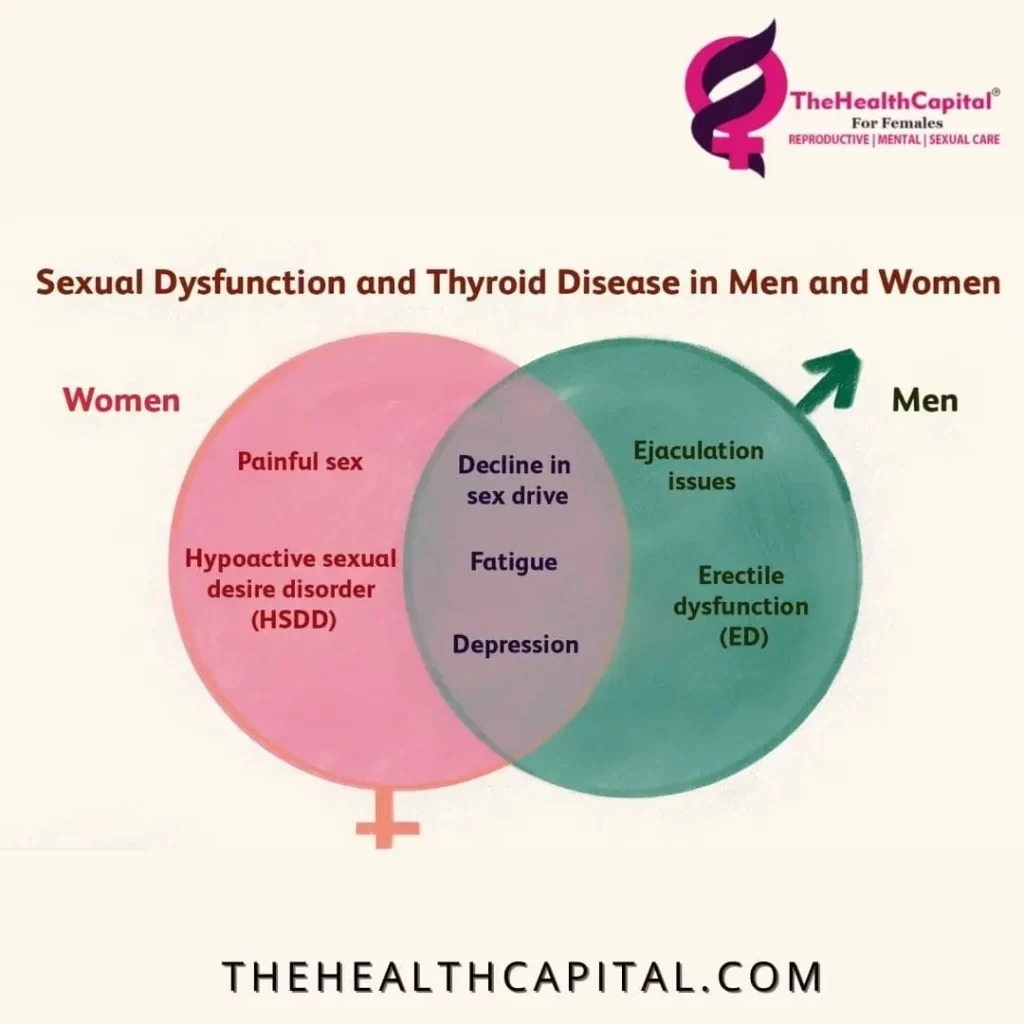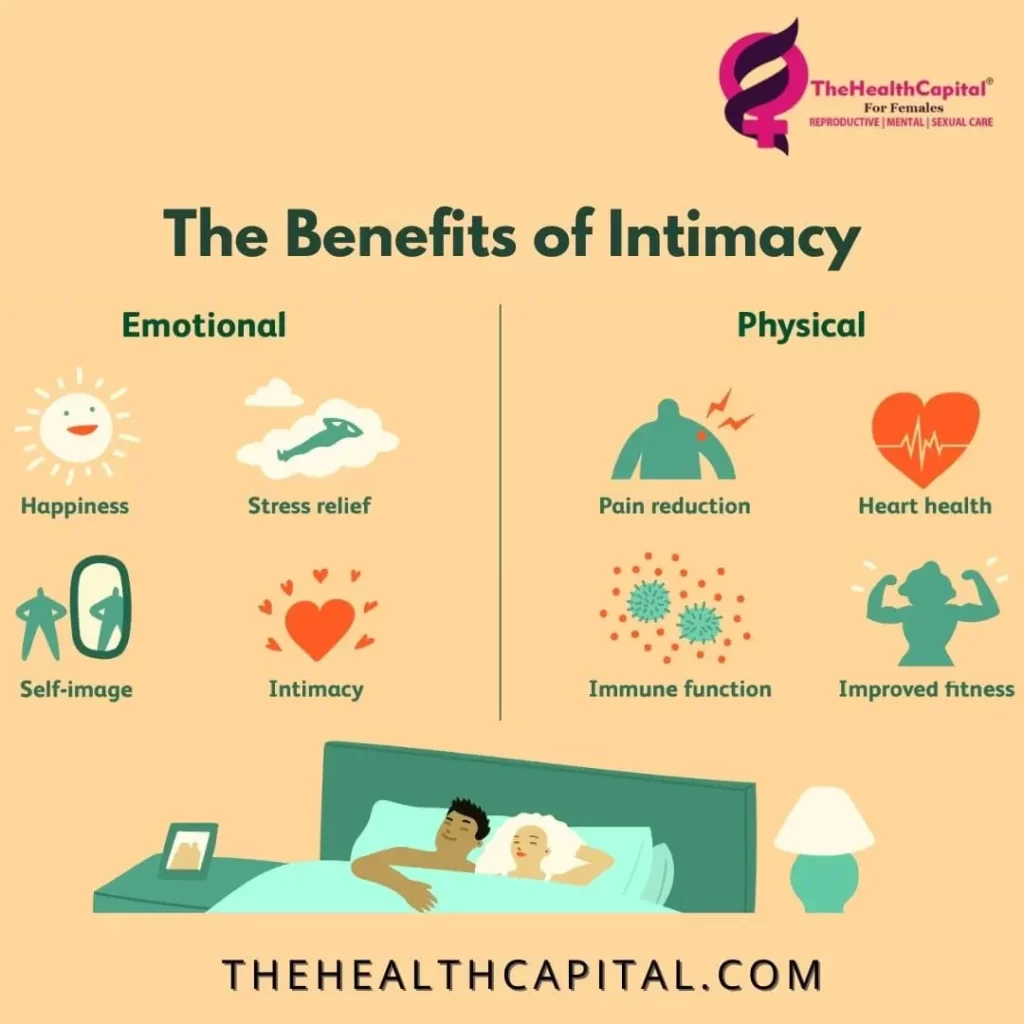The term “sexual health” describes a woman’s ability to completely engage in and enjoy sexual activities. Sex is a pleasurable activity that creates a deep connection between two people. It requires the sex organs, hormone-producing glands, the brain, and the rest of the body to be in sync. If it isn’t, then it can hamper your sexual life affecting your sexual desires and your ability to have sex. A woman’s sexual health is influenced by a variety of physical, psychological, interpersonal, and societal aspects.
Although sexual health can be viewed as an important marker for overall health, several hurdles impede women from accessing the right medical counselling, support, and/or care for their sexual needs and concerns. Due to social stigma, female sexual problems are not given much importance. Women are ashamed or embarrassed to talk about their sex life with healthcare professionals or even their partners. As a result, many women may face certain health conditions that adversely impact their sexual health without knowing about them.
Sexual Dysfunction in Women
Around 30 to 50% of women face sexual health problems at some point in their life. Sexual Dysfunction is any problem that occurs during the sexual response cycle, which includes desire, arousal, orgasm and resolution. The following are the most common problems related to sexual dysfunction:
- Desire disorders – These involve a lack of sexual interest and willingness to be sexual
- Arousal disorders – Inability to become physically aroused or maintain arousal during sexual activity
- Orgasm disorders – Persistent delay or absence of orgasm after sufficient sexual arousal and ongoing stimulation
- Pain disorders – Pain associated with sexual stimulation or intercourse
Causes of Sexual Dysfunction
When your hormones are fluctuating, like after childbirth or throughout menopause, female sexual problems can arise. Sexual dysfunction can also be caused by serious illnesses like cancer, diabetes, or cardiovascular disease. Other factors also contribute to sexual dissatisfaction or dysfunction:
- Physical causes – Many physical conditions can cause sexual health-related problems. Vascular disorders may prevent blood flow to the female reproductive system, affecting sexual arousal. Gynecologic conditions like Endometriosis, ovarian cysts, uterine fibroids and vaginitis can all cause pain during sex. Vaginismus which is the tightening of muscles of the vagina can also make intercourse uncomfortable. Health conditions like diabetes, arthritis, multiple sclerosis and heart disease can affect your ability to enjoy sex. Medications like antidepressants may reduce your sex drive or your ability to have an orgasm and chemotherapy can also affect hormone levels and cause problems.
- Hormonal causes – Menopause can lead to lower estrogen levels causing changes in your genital tissues and sexual responsiveness. This causes a decrease in blood flow to the pelvic region, reducing feelings in the genitals which can lead to a delay in arousal and orgasms.
- Psychological causes – Untreated anxiety or depression may cause a lack of interest in sex. Having low self-esteem or feeling hopeless can also cause sexual dysfunction. Pregnancy anxieties and the demands of being a new mother could have similar impacts. Enjoying sex might be challenging when you are stressed out. According to some studies, stress can raise cortisol levels which reduces sexual desires. Effects of past sexual trauma may also cause anxiety and a fear of intimacy making it difficult to have sex. Marital or relationship problems can diminish your sexual responsiveness as well.

Treatment for Sexual Dysfunction
By treating the underlying physical or psychological issues, the majority of female sexual problems can be resolved. Other treatment approaches include:
- Arousal techniques – Have a discussion with your partner about the various methods you could try to increase arousal and desire and think about altering your sexual regimen.
- Counselling – People facing sexual health issues that their primary doctor can’t help them with, can seek help from a sex therapist. For couples who want to enjoy their sexual relationship, it’s well worth the time and effort to work with a trained professional to overcome emotional or psychological barriers, leading to pleasurable sex life.
- Pain management – There are various methods for minimizing pain during sexual activity. You can experiment with various sexual positions, vaginal lubricants, or relaxation techniques before having sex. Vaginal dilators can also be used for women who experience narrowing of the vagina.
- Medication – The Health Capital provides safe and effective homoeopathic treatment, for female sexual problems. We advise regular exercise, a balanced diet, adequate sleeping hours, tips for stress reduction and medicines for sensual stimulation for a healthy sexual life.
Start a conversation about your sexual needs
Talking about your sexual desires may not be easy, and maybe a bit uncomfortable at first but it’s the first step towards achieving a healthy sex life. Sharing your thoughts and expectations about sex can help you and your partner understand the kind of changes you can make to your sexual regimen, leading to greater sexual enjoyment.
- If you’re feeling uncomfortable, say so – Express your concerns to your partner, if you feel shy discussing what you want. Get confirmation from your partner that he is open to the conversation and that you are both on the same page.
- Stick to a time limit – Avoid having a long conversation which might overwhelm both of you. Instead devote 15 minutes to the topic, which will make it easier for you to stay within your emotional comfort zones.
- Talk to each other about what you like – Instead of criticizing what they’re currently doing or not doing, it’s often more effective to provide positive suggestions.
- Make talking about sex a regular thing – The more you talk about sex, the easier the conversations get, improving your sex life.
- Talk about what’s working and what’s not – Talking things out can help couples solve a lot of issues that arise in the bedroom. Try to reach a compromise so that you both feel respected and heard.
- Read a book, or watch a movie – You could suggest chapters or sections in a book about women’s sexual health to your partner and ask them to read it. A scene from a movie could also serve as the basis for a conversation.
How to Achieve a Happy and Healthy Sex Life
Treatment for female sexual problems is now simpler than ever. There are medications and licensed sexologists available here at The Health Capital. However, by making a few changes to your lovemaking technique, you might be able to resolve minor sexual troubles.
- Know what you like and dislike in the bedroom – It’s important to know what feels good and what’s working, what turns you on and off, the stimulation you need to progress through the process of arousal, the positions you enjoy and a partner who is in sync with you, can help.
- Sexual self-confidence and a positive body image – It could be harder for a woman to enjoy sex if she doesn’t feel good about her physique. According to studies, a woman’s sexual happiness is predicted by her body image, which includes concerns about her weight, physical beauty, and thoughts about her body while engaging in sexual activity. People who feel better about themselves could think they are more attractive to other people sexually and might act more sensually.
In any case, it’s important to understand that while you’re in bed together, men tend to be more preoccupied with the specifics and sensation of sex during intercourse and deep stages of arousal than they are with another person’s body. - Educate yourself – For every kind of sexual issue, there are many excellent self-help resources available. You and your partner can browse the internet or read a book explaining the issue.
- Be physically affectionate – Kissing and cuddling are crucial for preserving an emotional and physical link, even when you’re worn out, uncomfortable, or upset.
- Be patient with yourself – Your sexual arousal decreases with age. You and your partner can boost your chances of success by selecting a peaceful, comfortable, interruption-free atmosphere for sex. Be aware that it will take you longer to become aroused and have an orgasm due to the physical changes to your body.

Don’t Give Up
Don’t lose hope if none of your efforts seems to be working. If you’re looking for sexual problem solutions, The Health Capital has the best sexologists that will be able to pinpoint the root of your sexual health issue and suggest appropriate treatment. This platform was built for women facing sexual, mental, reproductive, hormonal and lifestyle-related issues. Keeping in mind the sensitive nature of this topic, we want women to feel comfortable.
So we provide online consultations from the comfort of your own home. Feel free to talk to us about any sexual health problems you may be facing. We are here to provide you with a safe and judgement-free space, for you to talk about your sexual experiences. Together we can find a solution to your sexual health problems, so you and your partner can have a happier and more enjoyable sex life. If you want to better understand your sexual health, take a free sexual health analysis on our website.
FAQ’s
1. Where do I find sexual problem solutions?
The Health Capital has the best sexologists that provide sexual problem solutions. If you’re facing sexual health problems, book an appointment with us. Our doctors will do a thorough evaluation of physical and psychological factors tied to sex and pinpoint the problems affecting your sexual life. Through counselling and effective homoeopathic treatment, if needed we will help you overcome sexual problems, leading to a healthier sexual life.
2. Do I need sex therapy?
Examining which aspects of your life are most impacted by how you’re feeling at the moment can help you decide whether you need to visit a sex therapist. It’s a good idea to see a sex therapist if your sexual dysfunction has a significant impact on your quality of life and emotional well-being. A sex therapist is the best place to turn if your primary personal worry is a lack of intimacy or communication problems with a partner.
3. Can mental health problems affect your sex life?
Yes, untreated anxiety or depression can cause or contribute to sexual dysfunction, as can long-term stress and a history of sexual abuse. The Health Capital treats sexual as well as mental health problems. So if you’re experiencing either, book an appointment with us for an online consultation.
4. Can sexual health problems affect fertility?
Yes, problems in any of the phases of sexual response (desire, arousal, orgasm, resolution) as well as pain disorders may contribute to infertility.
5. Is sexual dysfunction a permanent condition?
Sexual dysfunction may simply disappear for some women. It also might only occur sometimes, such as during childbirth or hormonal fluctuations. Others may require continuing management of their sexual dysfunction. Counsellors and other forms healthcare experts are frequently needed to help with sexual dysfunction and we at The Health Capital are here to connect you with them.

